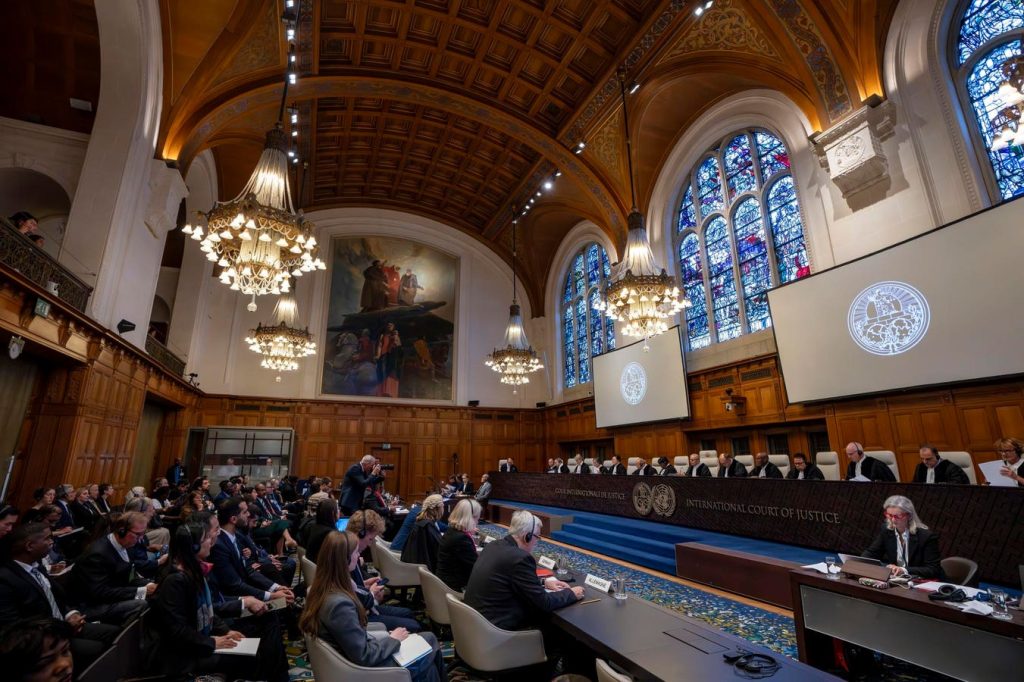The International Court of Justice (ICJ), also known as the World Court, recently concluded oral hearings concerning the obligations of states regarding climate change. This advisory opinion, sought by the United Nations General Assembly (UNGA) at the behest of Vanuatu, aims to clarify the financial liabilities of nations for their contributions to climate change and delineate the actions required to mitigate its effects. The hearings, held over two weeks in December 2024, witnessed presentations from over 100 countries and parties, highlighting the global concern surrounding climate change and its legal implications. While the Paris Agreement served as the central focus of legal arguments, a significant debate emerged regarding the existence of a human right to a clean, healthy, and sustainable environment. This concept has gained traction in other international legal arenas, adding weight to the discussions within the ICJ.
Developing nations contended that existing climate agreements, like the UN Framework Convention on Climate Change (UNFCCC) and the Paris Agreement, are insufficient to address the multifaceted impacts of climate change, which they argue infringe upon fundamental human rights enshrined in international common law and the Universal Declaration of Human Rights. Consequently, they advocate for reparations from major contributors to climate change, particularly those heavily involved in fossil fuel production and greenhouse gas emissions, to compensate for the adverse effects experienced by vulnerable, low-lying, and developing countries. This argument resonates with recent rulings in other international courts, including the European Court of Human Rights and the International Tribunal for the Law of the Sea, which have recognized a link between climate change impacts and human rights obligations.
The concluding remarks of the ICJ hearings centered around questions posed by four judges, prompting further submissions from participating states. A key question, raised by Judge Bogdan-Lucian Aurescu of Romania, delved into the existence and legal substance of a right to a clean, healthy and sustainable environment. The diverse responses received reflect the complexities of this issue and the varying interpretations of international law.
A spectrum of viewpoints emerged regarding the existence of a human right to a clean environment. Some states, including the United States, United Kingdom, and Russia, firmly denied the existence of such a right in customary international law, arguing that while environmental protection is important, it has not yet reached the threshold of a universally recognized human right. They emphasized the need for a transparent and consensual process for establishing such a right within the framework of international law. Germany, while acknowledging growing awareness and recognition of this right, also stopped short of affirming its existence in current customary international law. Kuwait further argued against the legally binding nature of UN resolutions regarding a healthy environment.
Conversely, many states, particularly developing nations and regional organizations, championed the existence of a right to a clean, healthy, and sustainable environment, asserting its inherent link to other fundamental human rights, including the rights to life, health, food, water, and an adequate standard of living. Countries like Thailand, Sri Lanka, Samoa, and Mexico underscored the interconnectedness between environmental quality and the enjoyment of these established rights, emphasizing that a degraded environment directly threatens human well-being and dignity. Samoa argued for its emergence as a standalone right, while Mexico detailed its substantive and procedural elements.
Regional blocs and organizations also weighed in on the matter. The Organization of African, Caribbean and Pacific States (OACPS) and the African Union firmly affirmed the right to a healthy environment as a fundamental human right, rooted in international declarations and regional instruments, and solidifying its place in customary international law. The European Union, while acknowledging ongoing debate about its status as customary law, argued that the right effectively exists through the systemic integration of international human rights and climate change obligations, citing the European Court of Human Rights’ recognition of protection from climate change impacts as falling under existing human rights.
The diverse responses submitted to the ICJ underscore the evolving nature of international environmental law and the complex relationship between human rights and climate change. While a clear consensus on the existence of a standalone right to a healthy environment remains elusive, there is a growing recognition of the crucial importance of environmental protection for the enjoyment of other fundamental rights. The ICJ’s advisory opinion is expected to provide valuable guidance on this critical issue, potentially shaping future climate litigation and informing the development of international environmental law. The opinion will likely consider the tension between established principles of international law and the emerging understanding of the interconnectedness between human rights and the environment in the face of the urgent global challenge of climate change.
The diverging perspectives highlight the significant implications of recognizing a right to a healthy environment. For proponents, such recognition would strengthen legal frameworks for environmental protection, empower individuals and communities to defend their environmental rights, and potentially increase the accountability of states for environmental damage, including climate change impacts. For those who express caution, the focus remains on the established processes for creating new norms of international law and ensuring state sovereignty in environmental matters. The ICJ’s advisory opinion will play a crucial role in navigating these complex legal and political considerations, ultimately influencing the trajectory of international efforts to address climate change and its far-reaching consequences.
The ultimate decision by the ICJ, while non-binding, carries significant weight in international law and is expected to influence future climate change litigation and policy development. The court’s interpretation of state obligations concerning climate change, including potential financial liabilities and preventative measures, will likely shape the international legal landscape for years to come. The advisory opinion’s impact on the recognition and scope of a human right to a healthy environment will also be closely watched, impacting the strategies employed by states and international organizations to address the growing climate crisis. The court’s deliberation and ultimate opinion will provide crucial guidance on the intersection of human rights and environmental protection in the context of a rapidly changing climate.










